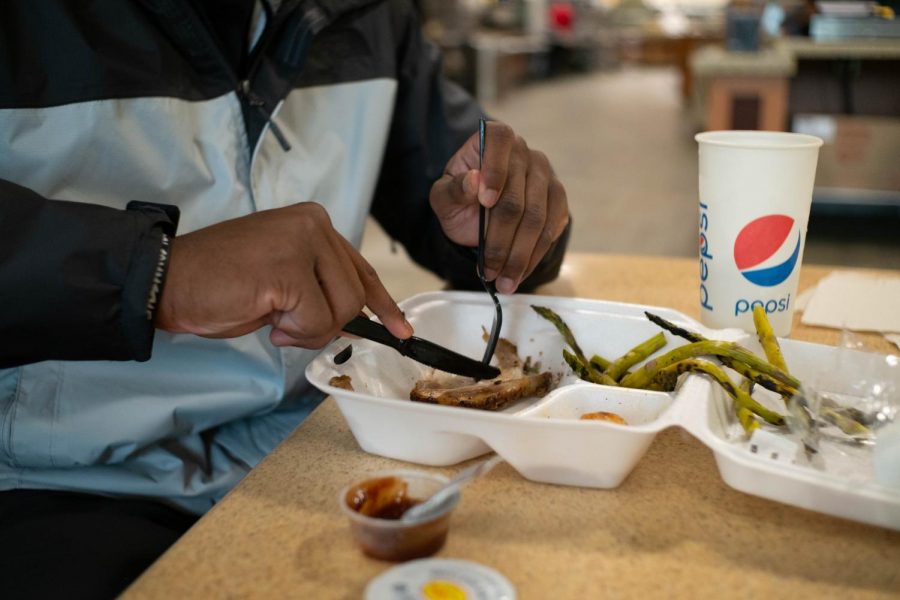Campus Dining limits sustainable food service to accommodate budget, COVID-19
Campus Dining is offering disposable cutlery and individually packaged condiments so individuals aren’t in contact with the same item. Compostable containers were replaced with plastic foam after the UNC System instructed institutions to cut expenses.
September 24, 2020
Navigating COVID-19 and saving funds, Campus dining is reducing its reusing and recycling in an effort to limit the spread of the pandemic.
Disposable cutlery and individually packaged condiments are now offered so multiple individuals aren’t in contact with the same item. Plastic foam was also reintroduced, replacing compostable containers, after the UNC System instructed institutions to cut expenses.
In late July, UNC System Board of Governors Chair Randall Ramsey instructed universities to plan for several budget scenarios given the possibility of decreased student enrollment or new COVID-related costs. Jennifer Maxwell, program manager for the Office of Sustainability, said that all areas of campus were encouraged to be “careful with spending” this semester.
Chancellor Sheri Everts looked over the decision to bring back plastic foam to-go containers, said Chief Sustainability Officer Lee Ball. After deliberation, Campus Services and the Office of Sustainability chose the lower-priced option over compostable paper because of the many containers necessary to serve everything to-go this semester.
“We’re just being pragmatic,” Ball said. “It doesn’t make sense to potentially lose a couple of jobs over a short-term sustainability goal.”
Devin Mullins, SGA director of sustainable development, also believes this decision was warranted given the circumstances. Mullins said the possibility of people losing their jobs to make room in the budget isn’t sustainable.
Moreover, Mullins said the community must take personal responsibility during this time to ensure sustainability is not forgotten.
Likewise, Maxwell said individual responsibility can help offset these changes.
“There’s still opportunities to make personal choices,” Maxwell said. “Even though there is not a lot of control over what type of to-go container, you can still make more sustainable choices.”
Maxwell said students who want to limit their impact could use reusable bottles and containers when able, choose meatless options, and only take the amount of food, condiments and cutlery they need.
Dining is continuing composting efforts in kitchens and dishrooms, but public bins in dining halls are closed. However, the Office of Sustainability, Crossroads and Wired Scholar have compost bins available for student use. Additionally, students can put food scraps into compost bins on Howard Street and next to the LLC to be used in the gardens.
The food grown in campus gardens, some of which goes to the Mountaineer Food Hub, is one example of Campus Dining sourcing local ingredients. In the 2019-20 academic year, 27% of dining hall ingredients were locally sourced, said Rachel Butts, assistant director of communications for Campus Services.
A portion of these ingredients comes from the university’s Sustainable Development Teaching and Research Farm in Ashe County. Dining partnered with the farm and gave it the financial resources to build a greenhouse, where more food can be grown year-round for dining halls. Thus, when students eat on campus they are supporting local businesses, an economic aspect of sustainability.
“We source local ingredients and all of our employees are from the local area,” Butts said. “By eating in the dining halls, you are supporting local – from the ingredients to partnerships with food trucks and other local businesses.”
Much of the food that isn’t used on campus is donated to the Hunger and Health Coalition, a local nonprofit. In the 2019-20 academic year, dining services donated 25,974 meals.
“This addresses a food waste issue as well as a local food insecurity issue,” Maxwell said.
Ball said none of the progress the Office of Sustainability has made so far would have been possible without the incredible partnership it has with Campus Dining.
“They are one of our best partners on campus,” Ball said.
He said Pam Cline, director of Campus Dining, and her team share their sense of urgency on sustainability and bring ideas to the office frequently.
Ball and Maxwell emphasized that recent changes are temporary and necessary during a pandemic. The two shared confidence that dining and App State as a whole will come out of the pandemic as strong, or stronger, than before.
“This progress that we have made is a long-term commitment and something that we have been working on for many years,” Ball said. “We know we will go back to where we were.”
















